Review Huawei MateBook X Pro 2020 - thin and light laptop with a minimum of compromises
Devices / / January 06, 2021
Huawei is associated mainly with smartphones and telecoms. However, the Chinese IT giant is not afraid to try its hand at other market segments: in 2018, it introduced the world to its first laptop, the MateBook X Pro. The model turned out to be extremely interesting, and after two years they decided to refresh it. Finding out if the MateBook X Pro 2020 can push the competition on Windows, as well as the MacBook Pro.
Table of contents
- Specifications
- Design
- Screen
- Input Devices
- Sound
- Speed
- Autonomy
- Outcome
Specifications
| operating system | Windows 10 Home |
| CPU | Intel Core i7-10510U Quad Core Eight Thread 1.8GHz (up to 4.9GHz Turbo) |
| Memory | RAM: 16 GB LPDDR3, 2 133 MHz; ROM: 1024 GB NVMe SSD |
| Video accelerator | NVIDIA GeForce MX250 |
| Display | 13.9 inches, LTPS, 3000 x 2000 pixels, 260 ppi, touch |
| Ports | 2 × Thunderbolt 3; 1 × USB ‑ A 3.0, audio jack |
| Wireless interfaces | Bluetooth 5.0; Wi-Fi 5, NFC, Huawei Share |
| Battery | 56 Wh, USB Power Delivery |
| Overall dimensions | 304 x 14.6 x 217 mm |
| Weight | 1.33 kg |
Design
The MateBook X Pro is built to all the standards of a premium laptop: the chassis is made from a single piece of aluminum, and all panels are treated and painted the same way. The edges have received subtle polished bevels, which adds an additional polish to the strict style of the device.
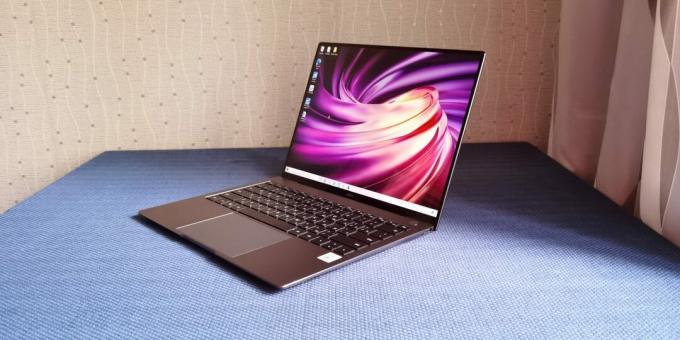
The fit of the parts and the quality of the materials are impeccable. Only the air duct grill is made of plastic, hidden from view behind a metal hinge. By the way, the laptop can be easily opened with one hand.
In terms of dimensions, the novelty is comparable to the MacBook Air with a much larger screen area - thanks to the thin bezels. Webcam built into the keyboard and slides out with a push. Not the best solution: in video calls, the interlocutors have to look at your chin, there is also no face unlock.

Of course, Huawei can justify the lack of space above the screen, but there are already models on the market that combine framelessness and the traditional position of the camera and sensors. For example, Dell XPS 13 9300 or the latest ASUS ZenBook. The only plus of the camera built into the keyboard is privacy, although this issue is easily solved by a shutter on the lens.
The laptop is equipped with a fingerprint sensor built into the power button. The scan is registered the first time it is pressed, the login to the system is quick and convenient. I also liked that the power button is separate from the keyboard - you won't be able to press it accidentally during typing.

On the left side are two USB Type ‑ C ports (USB 3.1 and Thunderbolt 3) and an audio jack, on the right is the only full-sized USB 3.0. By the way, both USB Type ‑ C support charging, which is convenient. However, it would be better if they were smashed to different sides.
Screen
The MateBook X Pro has a great touchscreen. The matrix with a diagonal of 13.9 inches is made using LTPS technology and has a resolution of 3000 × 2000 pixels. The pixel density of 260 ppi provides the highest picture clarity, and the aspect ratio of 3: 2 accommodates more lines at web surfingworking with tables, text and code.
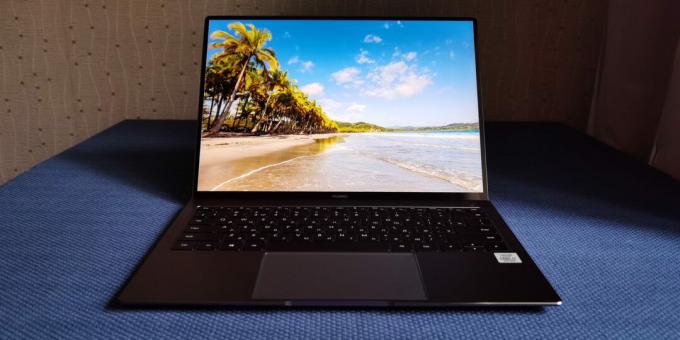
The margin of brightness is huge, which, together with a high-quality anti-reflective coating, gives excellent readability even in direct sunlight. Viewing angles and contrast level are not satisfactory, colors are also in perfect order: 100% sRGB coverage is declared.
This set of qualities allows you to use a laptop to work with photos and videos. However, it should be borne in mind that the screen cannot boast full coverage of Adobe RGB and DCI ‑ P3. If you are working in these color spaces, it is better to look at something else.
Input Devices
The keyboard in the MateBook X Pro pleases with a comfortable layout. You can only find fault with the small arrows ↑ and ↓, the rest of the keys are large enough for easy typing and are equipped with a scissor-type mechanism. The depth of the stroke here is greater than that of the new MacBook Air, clicks are worked out clearly. Also, the keyboard is equipped with a backlight with two levels of brightness.

The touchpad is very large and covered with glass, it is a pleasure to use it. The cursor accurately follows the finger, there are no "dead" zones at the edges, Windows Precision gestures are supported. In this regard, the laptop is almost as good as the MacBook Air, which is the benchmark.
The only thing where the MateBook touchpad loses to Apple's solutions is clicks. They only work at the bottom, while the Force Touch sensor in the MacBook registers them anywhere on the touchpad, and the Taptic Engine simulates feedback.
Sound
The laptop is equipped with four speakers, two of which are directed upwards. The sound is very loud and clear, but it lacks deep bass. However, the novelty is as close as possible in speaker quality to the latest MacBooks, and this is already an achievement.
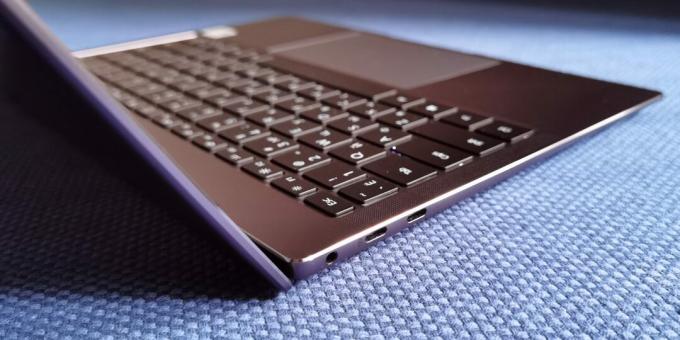
There are also four microphones for voice control and sound recording, and if few people use the first, then the second in the era remote work became extremely important. In this aspect, the novelty will not disappoint.
The built-in Realtek audio codec is responsible for the audio in the headphones. Oddly enough, here it produces a very decent sound, the volume reserve is also impressive.
Speed
The new MateBook X Pro is powered by the Intel Core i7-10510U processor using an improved 14nm process technology. The laptop is capable of entering turbo mode, supplying up to 50 watts of power to the processor. The frequency at such moments reaches 4.9 GHz per core, but working with it for longer than 16 seconds will not work: the cooling system cannot cope with the heat sink. The device quickly puts the processor on a leash, transferring it to a base power of 18 watts.
The MateBook X Pro is like a sprinter that is exceptionally fast over short distances. These speedups are enough to handle most tasks at lightning speed, from compiling code and running programs to processing files. The laptop achieves about 1,400 points in the Cinebench R20 benchmark, the system performance during the test is recorded by the Intel Power Gadget utility.

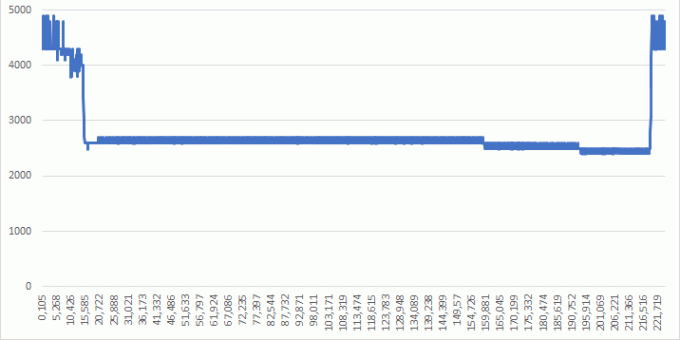


The amount of RAM is 16 GB, which is enough for comfortable multitasking work. The 1,024GB solid state drive delivers fast read and write speeds.

A discrete video accelerator NVIDIA GeForce MX250 is responsible for the graphics, but you should not expect impressive performance in games due to the limited thermal package (TDP) of 10 watts. This means that the video card is not capable of developing a high frequency. However, its capabilities are enough for easy work in programs that support GPU acceleration, for example, in the package Adobe or Blender 3D.
The laptop also supports external video cards with Thunderbolt 3 connection, but the performance gains vary from program to program. In addition, Intel Comet Lake processors do not have an integrated Thunderbolt controller - this is the prerogative of the Ice Lake generation. So the stability of work with external GPUs is a big question.
Autonomy
The battery capacity is 56 Wh. Huawei claims up to 13 hours of video playback. In reality, the model can withstand about 7 hours of work in Word with parallel web surfing in Microsoft Edge. Considering the compactness and rather powerful hardware, the laptop demonstrates decent results. It takes just over 3 hours to charge from the supplied adapter.
Outcome
The Russian price of Huawei MateBook X Pro 2020 is 130 thousand rubles. To understand whether it is adequate, it is worth going through the competitors. First of all, this is the basic MacBook Pro 2020, which will soon appear on our market. The cost of new items from Apple is still unknown, but should be about the same.
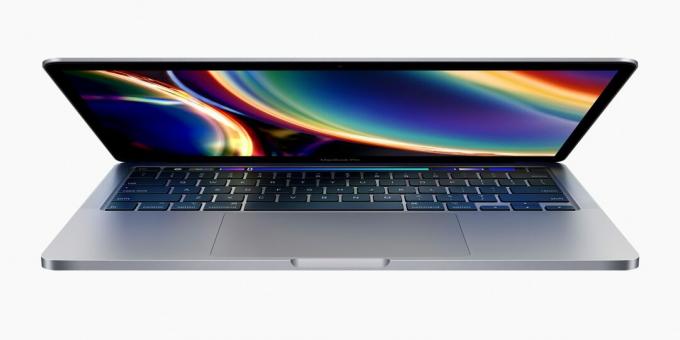
Operating systems aside, the MacBook Pro benefits from a DCI ‑ P3 capable display and the best touchpad on the market. On the Huawei side, dimensions, touch display, more memory, discrete graphics and a powerful processor with turbo boost.
Among the models on Windows, the main competitor to the MateBook X Pro is the DELL XPS 13 (9300). For the same money, the user gets a Full ‑ HD ‑ screen without support for touch input, an Intel Core i5 processor of the Ice Lake family, integrated graphics and half the amount of RAM and ROM. In return, DELL offers better work with external video cards, record autonomy, infrared face recognition and a webcam in a normal place.
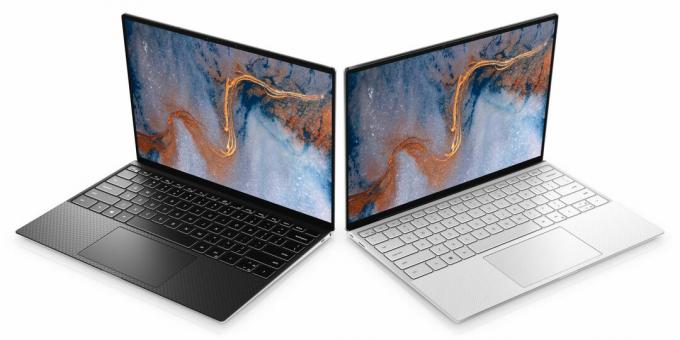
It turns out that the MateBook X Pro 2020 is quite a profitable option. Huawei did not overdo it with compromises, but released a balanced and high-quality product. If your tasks do not require a long processor load and high performance, it is worth considering this model for purchase.
Buy
The author thanks Huawei for the device provided for testing. The company had no way to influence the test result.
Read also🧐
- Which laptop to buy in 2020
- 10 good laptops cheaper than 30,000 rubles
- HP Elite Dragonfly Review - Magnesium Convertible Laptop


